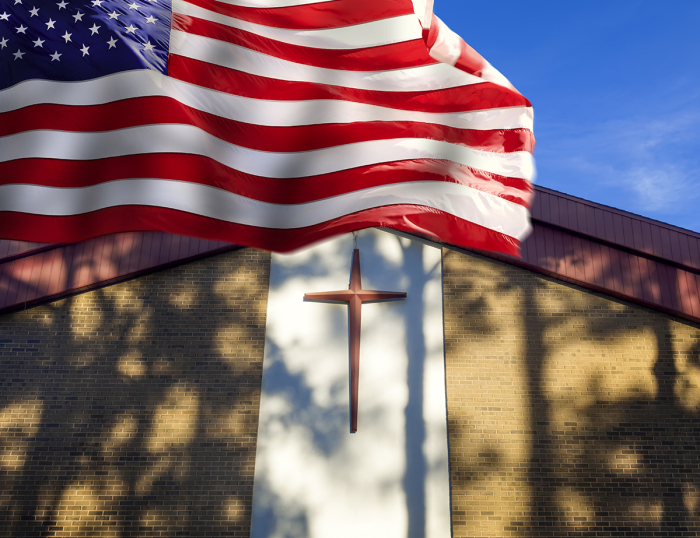The red herring of Christian nationalism

Imagine for a moment a U.S. president continuously engaging biblical references to undergird a political agenda.
Truth be told, former President Barack Obama mastered the art of Judeo-Christian biblical citations for the purpose of creating a moral imperative behind some of his most controversial policy initiatives.
He cited verses like “I am my brother’s keeper” (Genesis 4:9) to promote policies on healthcare and welfare. He often quoted Matthew 25:40, “Whatever you did for one of the least of these brothers and sisters of mine, you did for me,” to justify his social justice initiatives. Despite this, no one labeled him a Christian nationalist. Why? This irony highlights the selective outrage when Bible-believing Christians engage in the political process today.
The term “Christian nationalism” has emerged as a tool to distract and obstruct Bible-believing Christians in the American electoral process. This phrase, processed and delivered by the progressive left, aims to confront and impede Christian involvement in shaping the nation’s future. In order to bring clarity and build a firewall against potential political apathy in this upcoming election, here are five points to consider:
1. Christian Nationalism as a red herring
Christian nationalism serves as a red herring, diverting attention and creating obstacles for Bible-believing Christians participating in America’s electoral process. The progressive left, anxious about the fact that approximately 80% of white evangelicals vote conservative, uses this term to undermine Christian engagement. Pew Research shows that about 77% of white evangelical Protestants voted for Donald Trump in the 2020 election. This strong alignment with conservative values worries the left, leading them to use “Christian nationalism” as a pejorative. This term’s prevalence in media outlets underscores the left’s fear of Christians’ political influence.
Moreover, a majority of Hispanic evangelicals supported Trump, with a survey by the Public Religion Research Institute (PRRI) indicating that 55% of Hispanic Protestants voted for him in 2020. Does this make Latino believers Christian nationalists? The use of such labels to describe Christians from different ethnic backgrounds who support conservative policies demonstrates the term’s inconsistency and politicization.
The Bible encourages believers to engage in their communities and governance: “Seek the welfare of the city where I have sent you into exile, and pray to the Lord on its behalf, for in its welfare you will find your welfare” (Jeremiah 29:7). This call to engagement isn’t about imposing a theocracy but ensuring that our society reflects moral and just principles.
2. The agenda of the Lamb, not the donkey or elephant
True followers of Jesus Christ do not align themselves with the agendas of political parties. They are committed to the agenda of the Lamb. For Christians, the cross will always take precedence over the flag. Our rights come from God, not from men or governments. This divine perspective shapes our civic duty, urging us to engage in the public square out of a sense of moral and biblical responsibility.
According to Pew Research, many Christians believe that their religious beliefs should influence their political decisions. About 60% of U.S. adults say that religious beliefs should influence public policy, with a higher percentage among regular churchgoers. This conviction underscores that Christians see their faith as integral to their civic engagement.
Scripture reinforces this commitment: “But our citizenship is in heaven, and from it we await a Savior, the Lord Jesus Christ” (Philippians 3:20). While Christians participate in earthly governance, their ultimate allegiance is to God’s kingdom. Yet, they are called to be salt and light in the world (Matthew 5:13-16), influencing society with their values and actions.
3. The civic responsibility of Christians
Engaging in the public square is a civic, moral, and biblically substantiated responsibility for Christians. We are called to influence society positively and ensure that our nation’s values reflect the teachings of Jesus Christ. This involves advocating for life, liberty, and the pursuit of happiness while resisting efforts to undermine Judeo-Christian values.
Pew Research data indicates that many Christians believe they have a duty to participate in the political process. In a 2019 survey, 56% of U.S. adults said churches and houses of worship should express their views on social and political issues. This sentiment is even stronger among evangelicals, with 75% supporting church involvement in political discourse. These statistics highlight that Christians believe their faith calls them to engage actively in shaping public policy.
The Bible mandates this involvement: “Render to Caesar the things that are Caesar’s, and to God the things that are God’s” (Mark 12:17). Christians respect governmental authorities (Romans 13:1-7) while upholding God’s higher moral law. This dual responsibility requires Christians to be informed and active participants in the political arena, ensuring that laws and policies reflect biblical principles.
4. The marginal presence of theocratic aspirations
The notion that Christians en masse seek to establish a theocracy is grossly exaggerated. A small segment of Christians, arguably in single digits, may advocate for a theocratic governance model. However, this group is so marginal that it is de minimis. Most Christians do not seek to transform America into a new Jerusalem but aim to live out their faith authentically within a democratic society.
Barna Group research shows that most Christians support the protective constitutional guarantees regarding church and state, recognizing that a healthy democracy requires respect for diverse beliefs and freedom of conscience. Only 18% of U.S. adults, including Christians, believe the government should declare the United States a Christian nation. This statistic underscores most Christians’ commitment to a pluralistic society where religious freedom is protected for all.
Nevertheless, Christians must remain vigilant, ensuring that their focus stays on the finished work of Jesus Christ and not on earthly power structures. Political engagement should be a means of bearing witness to our faith, not an end in itself. By maintaining this perspective, Christians can avoid the pitfalls of conflating their religious identity with nationalistic fervor.
The Bible warns against misplaced priorities: “For where your treasure is, there your heart will be also” (Matthew 6:21). Christians must guard against allowing political engagement to overshadow their primary mission of spreading the gospel and living out Christ’s teachings.
5. Pushing back against disparaging nomenclature
Christians must actively resist the liberal media, pundits, and institutions that use disparaging terms to suppress Christian civic engagement. Terms like “Christian nationalism” stigmatize and discourage Christians from fulfilling their civic duty. We must vote for principles that align with our faith: life, religious liberty, biblical justice, parental rights, and limited government. While Uncle Sam may be our uncle, he will never be our heavenly Father. Our ultimate allegiance is to God, and our participation in the public square must reflect this truth.
Pew Research has documented the media’s portrayal of religious groups and found that conservative Christians are often depicted negatively. This bias can discourage Christians from engaging in the political process, fearing backlash or misrepresentation. However, it is imperative that Christians stand firm in their convictions and continue to advocate for policies that reflect their values.
Lifeway Research reports that many Christians feel marginalized and misunderstood by the media, with 60% of Protestant pastors believing that religious liberty is on the decline in the United States. This perception fuels Christians’ resolve to remain active in the public square, advocating for their rights and the principles they hold dear.
The Bible encourages believers to persevere in the face of opposition: “Blessed are those who are persecuted for righteousness’ sake, for theirs is the kingdom of heaven” (Matthew 5:10). Christians must continue to stand up for their beliefs, knowing that their ultimate reward is not in earthly success but in faithfulness to God’s calling.
Conclusion: Addressing the elephant in the room
The progressive left’s use of the term “Christian nationalism” has more to do with Donald Trump and his candidacy than with Christian engagement in the public square. The fact that the vast majority of Bible-believing Christians, primarily in the Caucasian and Hispanic communities, support the policies of Donald Trump is the real reason this term is used so disparagingly. Surveys and studies confirm that Bible-believing Christians support policies that align with their faith, not necessarily the personality of the candidate.
Accordingly, Christians must push back on rhetoric and activities that counter the spirit of righteousness, justice, truth, and love found in Psalm 89:14: “Righteousness and justice are the foundation of your throne; steadfast love and faithfulness go before you.” As followers of Jesus we must support policies that advance life, religious liberty, biblical justice, parental rights, support for Israel, and limited government. This stance is based on the belief that our allegiance is to God over man and man over government.
Hence the question arises; When Donald Trump is no longer running for president, will this phrase continue to occupy space in the lexicon of political warfare? As Christians, we must continue to stand firm in our convictions and engage in the public square with integrity and faith. “Let us not grow weary of doing good, for in due season we will reap if we do not give up” (Galatians 6:9). Our participation in the political process is a testament to our faith and our commitment to a just and moral society.
Rev. Samuel Rodriguez is lead pastor of New Season, is the president of the National Hispanic Christian Leadership Conference, a bestselling author and executive producer of films like “Breakthrough” and “Flamin’ Hot.”




























